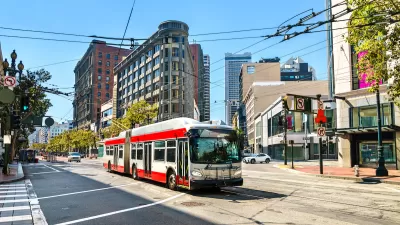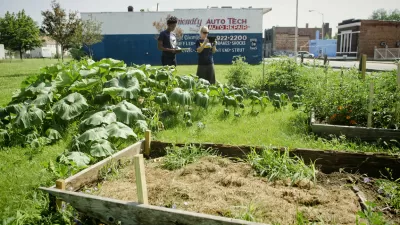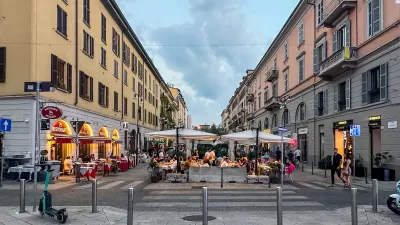Often, participants in public debates use words to mean things very different from their common-sense meanings, in order to manipulate the public’s emotions. Two examples in the field of urban planning come to mind.
Often, participants in public debates use words to mean things very different from their common-sense meanings, in order to manipulate the public's emotions. Two examples in the field of urban planning come to mind.
Road lobby supporters claim to be for "mobility." In their lingo, "mobility" means "the ability to drive as fast as possible." But in common English, mobility means the ability to move from place to place generally. The two concepts are quite different because sometimes, policies designed to improve drivers' mobility impede mobility for others. For example, if a two-lane, slow-traffic street is widened to ten lanes, pedestrians may not be able to safely cross that street. Thus, those pedestrians are actually rendered less mobile by ostensibly pro-"mobility" policies. Similarly, if a new road shifts development to a place without public transit, transit-dependent job-seekers are effectively rendered less mobile, since they cannot easily reach jobs in the newly created "edge city." Fast car traffic may have its virtues, but it is not the same thing as mobility for all.
But environmentalists are also adept in manipulating the language. A common environmentalist buzzword is "sustainability." In environmentalist lingo, "sustainable" really means "environmentally sound" - a policy that ought to be adopted or a design that ought to be imitated. But according to dictionary.com, "sustainable" does not mean something that should be sustained; rather, it means "capable of being sustained. " Now, I would love to believe that sprawl cannot be sustained. But if I did, I probably wouldn't waste time writing about why it shouldn't be; instead, I would declare victory, seek an alternative career, and spend my days in giddy celebration of our glorious (or at least pedestrian-friendly) future. By confusing what ought to be sustained ("sustainable" in the sense environmentalists use the term) with what is likely to be sustained ("sustainable" in the dictionary sense of the term) environmentalists mangle the English language.

Alabama: Trump Terminates Settlements for Black Communities Harmed By Raw Sewage
Trump deemed the landmark civil rights agreement “illegal DEI and environmental justice policy.”

Planetizen Federal Action Tracker
A weekly monitor of how Trump’s orders and actions are impacting planners and planning in America.

The 120 Year Old Tiny Home Villages That Sheltered San Francisco’s Earthquake Refugees
More than a century ago, San Francisco mobilized to house thousands of residents displaced by the 1906 earthquake. Could their strategy offer a model for the present?

In Both Crashes and Crime, Public Transportation is Far Safer than Driving
Contrary to popular assumptions, public transportation has far lower crash and crime rates than automobile travel. For safer communities, improve and encourage transit travel.

Report: Zoning Reforms Should Complement Nashville’s Ambitious Transit Plan
Without reform, restrictive zoning codes will limit the impact of the city’s planned transit expansion and could exclude some of the residents who depend on transit the most.

Judge Orders Release of Frozen IRA, IIJA Funding
The decision is a victory for environmental groups who charged that freezing funds for critical infrastructure and disaster response programs caused “real and irreparable harm” to communities.
Urban Design for Planners 1: Software Tools
This six-course series explores essential urban design concepts using open source software and equips planners with the tools they need to participate fully in the urban design process.
Planning for Universal Design
Learn the tools for implementing Universal Design in planning regulations.
Clanton & Associates, Inc.
Jessamine County Fiscal Court
Institute for Housing and Urban Development Studies (IHS)
City of Grandview
Harvard GSD Executive Education
Toledo-Lucas County Plan Commissions
Salt Lake City
NYU Wagner Graduate School of Public Service






























